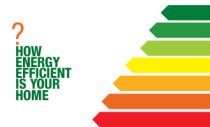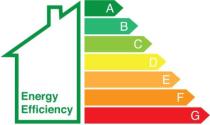
Need an EPC in Herefordshire? Come to Marches Energy Assessors.
What is an EPC?
If you are in the process of selling or letting a property in Herefordshire, you must order an EPC before you market the property.
When a property is being sold, the seller is responsible for providing an EPC. When the property is to be rented, the landlord is responsible for providing the EPC.
An EPC is a four page document containing information about a property’s energy use and typical energy costs. It also contains recommendations on how to reduce energy costs and save money. An EPC gives a property an energy efficiency rating similar to those found on electrical appliances. The ratings vary between A (most efficient) to G (least efficient). A current EPC is valid for 10 years.
The energy rating is based on data gathered by ourselves relating to the space heating, water heating, lighting and construction and insulation of the exterior parts i.e. walls, floors and ceilings. A synopsis of the property can be found on page two of the certificate which summarises the data entered by us. EPCs are produced using standard methods with standard assumptions about energy usage. This allows potential buyers and tenants to compare energy efficiency of properties of a similar type.
The EPC
will list recommendations which may improve the energy efficiency of your property. Some improvements may be eligible for the governments Green Deal scheme. The Green Deal allows owners or
tenants to make their property more energy efficient without having to pay any up-front costs. The EPC will display which recommendations will be entirely funded or part funded by the Green
Deal. You choose which measures you want and organize a quote from a Green Deal provider.
They will organise installation from an authorised installer and you pay for the improvements through your electricity bill at no greater cost than the savings from those improvements.
Should you move home, the repayment passes to the new bill payer.
What does an EPC Inspection involve?
If you are in need of an EPC in the 3 Counties area, make an appointment with us at a time convenient for you and our fully qualified Domestic Energy Assessor - Tim Bosson. Tim will personally visit your property to gather the necessary data for your Energy Performance Certificate.
For most properties the survey will take no longer than 30-40 minutes. Tim will need access to each room, the heating system and the loft space, should you have one (we will supply a ladder for access). At the time of the inspection Tim will take an email address from you so a copy of the certificate can be sent to you within 24 hours.
The data we record will include but may not be limited to;
• The
property’s age
• The construction details
• The insulation of the walls e.g. Cavity fill
• The insulation of the floors
• The loft insulation
• The space heating and their controls
• The water heating
• Extensions, conservatories or loft rooms where applicable
• The glazing type
• The presence of Low energy light-bulbs
• The electricity meter
• Presence of renewable technologies e.g. solar panels
• Any other points of interest
Should you have any information or documentation relating to the above, please volunteer it at the time of inspection. Photographs will also be taken to provide supporting evidence for the data collected on site. We will not inspect appliances e.g. washing machines, and will only account for low energy light-bulbs in permanent fixed fittings i.e. not those in lamps.
Improving Energy Efficiency in your home?
Once an
appointment has been made for your EPC assessment you may have time to improve
your property’s energy efficiency before the assessment is made. Below are low-cost improvements, typically
those under £500, that could improve your energy rating.
Low-energy lighting
Low-energy lighting
A low
energy bulb is an easy improvement to make and one that can mean real savings on your
electricity bill. A low energy bulb produces light for 80% less energy than a normal bulb. Having
low energy bulbs in 75% of your fixed fittings will receive a very good rating on your EPC. They
are compact fluorescent bulbs that can last up to 10 000 hours. Low energy bulbs can still be
fitted in downlights, but those fitted in removable lamps will not be counted.
Loft insulation
Improving your loft insulation to the current building regulations of 270mm will have a
significant effect on your EPC rating. If there is less than 150mm insulation in your loft space the
EPC will recommend increasing it to 250mm. Loft insulation can be fitted by any able-bodied
person and to save time the insulation can be laid over joists.
Hot water cylinder insulation
If your
property has a hot water cylinder it should be adequately insulated. The EPC will
recommend fitting an additional jacket even if your cylinder already has factory applied foam
insulation. Check your cylinder, if it has factory applied spray foam of less than 25mm, fit an
additional jacket. If your cylinder already has a jacket but it is less than 80mm fit an additional
jacket to increase the total width to 80mm. Fitting insulation to an uninsulated cylinder will
significantly improve your EPC rating. Fitting a cylinder thermostat to a cylinder in a gas central
heating system is also an EPC recommendation.
Improving energy efficiency within your home is a great way to increase your EPC score as well as to save you money.
There
are those measures such as cavity wall insulation and improved heating controls such as
programmers, room thermostats and thermostatic radiator valves that will dramatically improve
your EPC rating. However, these measures are more costly and will need to be carried out by a
qualified professional.




